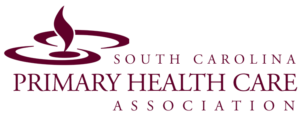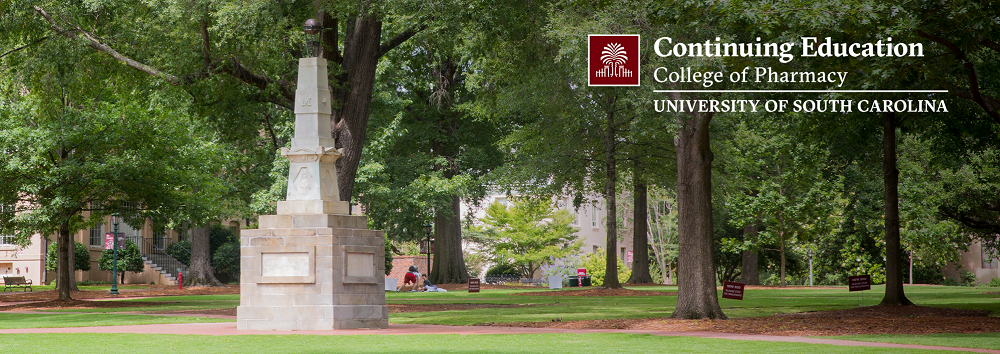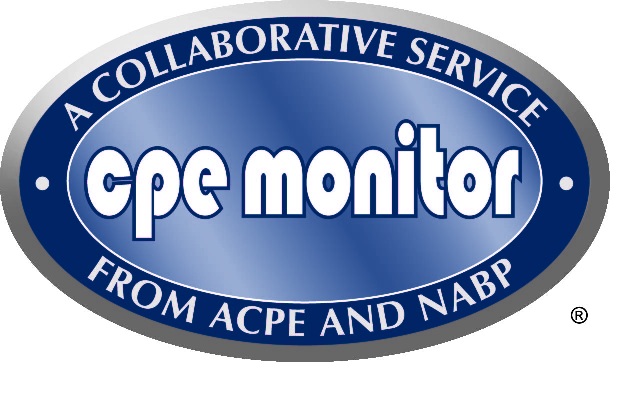
Date: Aug 13, 2020 08:00 AM - Sep 24, 2020 02:30 PM
Fee
CE Hours
CE Units
Activity Type
- Knowledge-Based and Application-Based
Target Audience(s)
- Pharmacists
Accreditation(s)

|
The University of South Carolina College of Pharmacy is accredited by the Accreditation Council for Pharmacy Education as a provider of continuing pharmacy education.
|
Co-Sponsor(s)
Requirements for CE Credit
- Describe common habits and behaviors that can negatively impact workplace culture
- Discuss ways to improve the quality of interactions between employees in the workplace
- Describe how to transform a team into a band of collaborators committed to working hard, getting along, and wowing patients
Speaker(s)/Author(s)
|
Joe Mull, M.Ed
|
Activity Number
0062-9999-20-165-L04-PCE Hours
- Describe the five core elements of medication therapy management
- Discuss research and evidence-based programs that advance a pharmacist's role in the clinical treatment team to optimize drug therapy and improve therapeutic outcomes for patients
- List 5 steps you can start Monday morning to integrate your pharmacists into your hypertension treatment team
- Describe barriers to effectively diagnosing and treating hypertension and diabetes in adolescents
- Discuss strategies to enhance youth engagement and motivation to participate in lifestyle change programs
- Outline individual care team members roles among adolescent patients with hypertension and diabetes
- Recognize the importance of care coordination among patients diagnosed with hypertension
- Identify clinicians and care teams to support blood pressure management in a community health setting
- Describe how a team-based approach can manage co-occurring diseases and reduce provider burnout
Speaker(s)/Author(s)
|
Bonita Falkner, MD
|
|
|
Cecily DiPiro, PharmD
|
|
|
Daniel T. Lackland, DrPH, FACE, FAHA, FASH
|
Activity Number
0062-9999-20-166-L01-PCE Hours
- Discuss how COVID-19 has impacted SUD prevention, treatment, and recovery services
- Discuss the gaps in OUD treatment options and discuss emerging approaches for OUD treatment
- Describe best practices in increasing access to MAT to describe major barriers to access to and utilization of MAT
- Discuss how to increase initiation and engagement to integrate SUD treatment into the general health care system
- Describe how to expand treatment options to cover the care continuum, including peer and recovery specialists, to help provide access to care at the level most relevant to patients
- Discuss ways to provide better, focused medical care for people with substance abuse-related diseases
- Discuss policies and procedures that are needed to provide services allowing for more seamless sharing of information - with needed consents - between substance use and primary care providers, given that both addiction treatment and healthcare services are provided by the same organization
Speaker(s)/Author(s)
|
Daniel L. Myers, LPN
|
|
|
James E. Campbell, LPC, LAC, MAC, CACII
|
|
|
Taanya Mannain, LISW-CP
|
Activity Number
0062-9999-20-167-L01-PCE Hours
- Outline CareSouth Carolina's leadership team's logic and strategy used in the design of the quality incentive program
- Describe how the leadership team manages the quality incentive program and lessons learned from implementing the program 3-years and counting
- Discuss the impact of the quality incentive program experienced thus far and projected in the future on patient outcomes, quality reporting and HRSA Quality Awards
- Describe how clinical initiatives focused on expanding prevention services for Medicare patients impact patient outcomes and clinical performance measures
- Outline the internal processes needed to facilitate the implementation of the U.S. Preventive Services Task Force (USPSTF) recommended prevention services, including but not limited to hepatitis C, colon cancer, osteoporosis, breast cancer, and abdominal aorta aneurysm screening
- Discuss solutions to barriers in implementing a specialty preventive care program that clinical leaders can use to inform their practice
- Identify the opportunities for telehealth services in rural and underserved communities struggling with diabetes
- Discuss how remote monitoring and other forms of telemedicine can help close the gap in care delivery
Speaker(s)/Author(s)
|
Dawn Dericke, RN, BSN, CCRC
|
|
|
Heather Leisy, MD, MBA, MPH
|
|
|
Joseph Hoyle, MD, MPH, FAAFP
|
|
|
Randall M. Carlyle, MPA
|
Activity Number
0062-9999-20-168-L04-PCE Hours
- Increase awareness of Million Hearts® strategies and activities for 2020
- Develop strategies for increasing patient engagement and activation in hypertension self-management
- Identify opportunities to collaborate with community partners to address patients' social and economic needs
- Develop strategies to maximize patient visits to support of hypertension management
Speaker(s)/Author(s)
|
Andrea Heyward, MHS, MCHES
|
|
|
Crystal Maxwell, MD, MBA, FAAFP
|
|
|
Daniel T. Lackland, DrPH, FACE, FAHA, FASH
|
|
|
Edward Behling, MD, MPH
|
|
|
John Bartkus, PMP, CPF
|
|
|
Tricia Richardson
|
Activity Number
0062-9999-20-169-L01-PCE Hours
- Outline 340B program requirements and program compliance requirements, to include recent changes or updates
- Discuss updates on the Office of Pharmacy Affairs interpretation of or guidance on rules and regulations that impact the provision of drugs to populations served by health centers
- Discuss the importance of and how to align compliance plans for 330 and 340B funding
- Describe current program compliance issues that have been identified during audits (internal and external)
- Outline best practices for demonstrating value and return on investment of 340B savings in health centers
- Develop a plan for communicating to stakeholders how health centers utilize 340B funds to support high-quality patient care for uninsured and underinsured patients
Activity Number
0062-9999-20-170-L04-PCE Hours
- Describe the diabetes disease process and treatment options
- Outline the national standards for DSME programs and the accreditation process
- Describe how to manage coding, billing, and claims management processes to successfully oversee the revenue cycle of a DMSE program
- Discuss how to leverage telemonitoring and telehealth technology to support a DSME program
- Describe evidence-based methods for reducing no-show rates and increasing patient engagement
- Discuss best practices for using in-person translators and translation services (e.g. telephonic support) for dietetic services and DSME programs
- Identify health disparities among special populations by making data informed decisions
Speaker(s)/Author(s)
|
Mary Ann Hodorowicz, RDN, CDE, CEC, MBA
|
Activity Number
0062-9999-20-171-L01-PCE Hours
- Review data trends related to adolescents in sexual health and risk behavior
- Recall communication tips for providers working with adolescents
- Discuss core components of youth-friendly health care
Speaker(s)/Author(s)
|
Rena Dixon, PhD, MPH, MCHES
|
Activity Number
0062-9999-20-185-L01-PCE Hours
- Describe two evidence-based strategies to improve contraceptive services at your community health center
- Define, map, and identify common processes in workflows to better improve health outcomes
- Create the persona of the contraceptive care champion
Speaker(s)/Author(s)
|
Johnese Bostic
|
|
|
Katherine Plunkett, LMSW, MPH, PCMH-CCE
|

